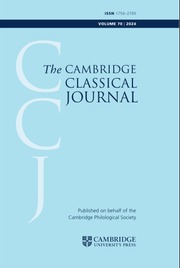No CrossRef data available.
Article contents
KNOWLEDGE, SUFFERING AND THE PERFORMANCE OF WISDOM IN SOLON'S ELEGY TO THE MUSES AND THE BABYLONIAN POEM OF THE RIGHTEOUS SUFFERER
Published online by Cambridge University Press: 30 April 2019
Abstract
This article offers a comparative reading of Solon's Elegy to the Muses (fragment 13 West) and the Babylonian Poem of the Righteous Sufferer, focusing on the interplay of literary form and theological content. It argues that in both poems, shifts in the identity and perspective of the poetic voice enable the speaker to act out, or perform, a particular vision of humanity and its relationship with the divine. The comparative analysis improves our understanding of both texts, showing for instance that Solon's elegy is a highly sophisticated attempt to articulate a coherent vision of divine justice and the human condition. It also sheds light on the particular modes in which ancient literature and theology interact in different contexts, and how this interaction could affect audiences.
- Type
- Research Article
- Information
- Copyright
- Copyright © The Author(s) 2019. Published by Cambridge University Press
Footnotes
This article is based on a paper presented at the Venice International University Advanced Seminar in the Humanities in 2016. It was completed with the support of the Leverhulme Trust, which I gratefully acknowledge. For their help and comments at various stages, I should like to thank Douglas Cairns, Antoine Cavigneaux, Yoram Cohen, Aino Hätinen, Johannes Haubold, Clare Loughlin, Felicity Loughlin, Christopher Metcalf, Andrea Rodighiero, Max Stocker and audiences in Venice and Pisa. I am also grateful to CCJ’s anonymous referees for their helpful comments.


